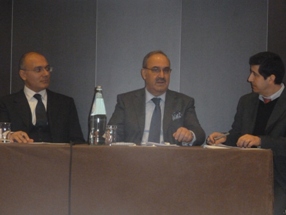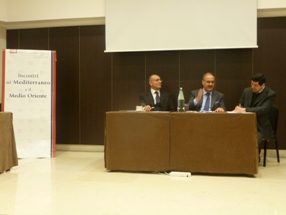This topic has been discussed in Rome on Monday, the 8th of April, during a meeting organized by the Center for the Middle Eastern Studies of the FPSC (CEMOFPSC).
The guest speaker was Mr. Habib Mohammed Hadi Ali Al-Sadr, the ambassador of the Republic of Iraq to the Holy See.
“Today, the Iraq’s ambassador said, referring to his nation that achieved to free itself from the foreigners, the people have adopted the appreciation for knowledge, along with the moderation and the mutual communication. In addition to the reconstruction of the democracy model, the country achieved an economic growth rate of 9%. The trade with Iran and Turkey has intensified, reaching a number of $16 billion annually. All this has led to an end of fears of the neighboring countries in establishing trade relations with Iraq”.
“The new Iraq should work for the development of a national identity. However, this should not happen by eliminating the specific national, religious and confessional identity of the country. Instead, it should improve and consolidate the various components that are the starting point to strengthen the unity and the speed progress of the reconstruction.”
Later, the Iraqi ambassador focused on the issue of the Christian presence. He said “the Christians are witnesses of the bitter era of Saddam, which has led to a first wave of migration.
He then welcomed the new government in hope of a bright future.
“But…” he warned, “the enemies of freedom -Baathists and Saddamists- do not require much time to sow terror and social disorder and poisoning the historic peaceful coexistence between the Christians and the Muslims that have always distinguished the Iraqi society.
Therefore, a second great wave of immigration arose to the Region of Kurdistan or to the West “.
“Today, however…” al-Sadr said “The Constitution guarantees the rights of citizenship, freedom of religion and consciousness.The Ministry of Human Rights has established a special office for religious and ethnic groups to monitor progress in the humanitarian position of the minorities, who are able to report any violation of their rights “.
Furthermore, the new electoral law guarantees the Christian minority five parliamentary seats.
There is freedom to organize parties and create clubs, associations and organizations, even within the media and the press.
They are also allowed to use the Syrian language to express themselves better and to express their concerns when undertaking projects.
The Iraqi government has also established a government department for the Christian superintendents which is state funded with a budget of about $ 20 million a year to spend on the Churches and their restorations and in educational and health institutions that the regime has nationalized and returned to the Christians.
“As an incentive to attract the Christians back into the country, the government is undertaking a range of legal and financial services. Like the application by the President which was created for this purpose dedicated to the Christians. Personally, I am very optimistic about the future of the Christian presence in Iraq. The Christians can enjoy a prosperous future, being ensured of the security and the economic prosperity”.






